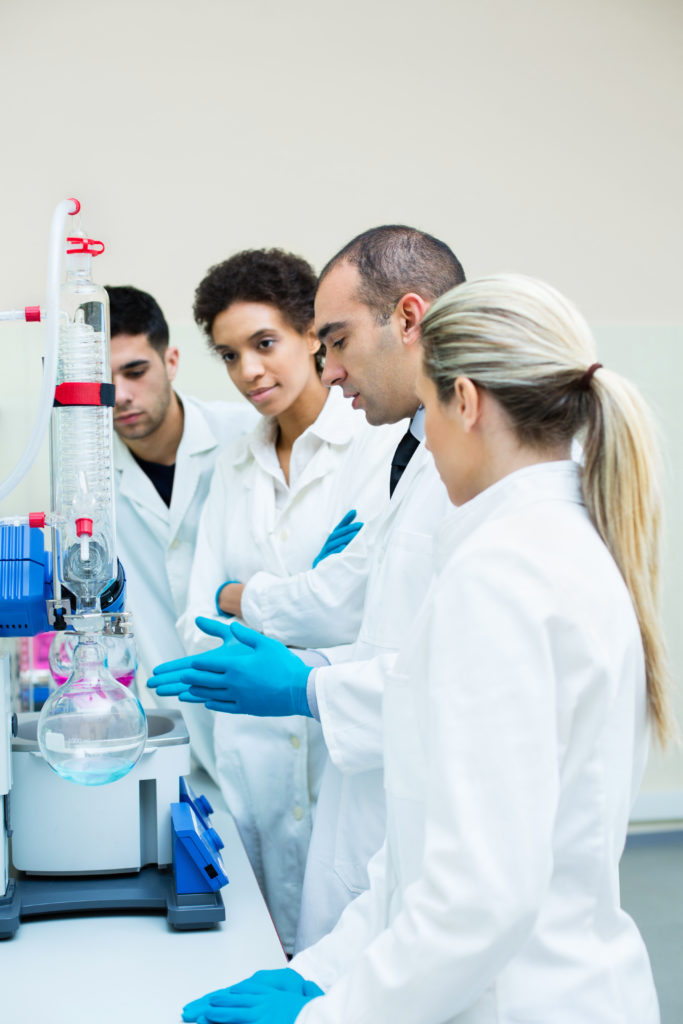 The Scholarly Pursuit and Thesis (SPT) course is integrated longitudinally throughout the School of Medicine four-year curriculum. It is designed to develop physicians who are life-long learners capable of critical inquiry and medical information literacy to produce physicians for patient-centric care. Students will rediscover curiosity and skills needed to understand and use evidence-based approaches for basic and clinical research. The students will work closely with mentors they choose, course directors, and faculty to utilize these skills to develop a scholarly research prospectus. By the end of the SPT course, students will each write a capstone thesis and present their projects to the community at a research symposium showcasing their findings and innovative ideas for the future of medical research and patient care.
The Scholarly Pursuit and Thesis (SPT) course is integrated longitudinally throughout the School of Medicine four-year curriculum. It is designed to develop physicians who are life-long learners capable of critical inquiry and medical information literacy to produce physicians for patient-centric care. Students will rediscover curiosity and skills needed to understand and use evidence-based approaches for basic and clinical research. The students will work closely with mentors they choose, course directors, and faculty to utilize these skills to develop a scholarly research prospectus. By the end of the SPT course, students will each write a capstone thesis and present their projects to the community at a research symposium showcasing their findings and innovative ideas for the future of medical research and patient care.
Mentors and Projects
Mentors and projects that the students and mentors develop can come from any field as long as the students can propose a project that can be researched effectively, includes some sort of intervention or examination (experiment, chart review, product design, data collection, etc.), has a good plan for analysis of results, and will include a discussion of the results with potential application and questions for the future.
Time with the student will vary from project to project. Overall, the mentor needs to commit to working with the student for four years (projects chosen and designed at approximately end of semester 1 and thesis submitted at approximately end of semester 7). However, during this time due to obligations and schedules of both, this may mean meeting from almost every day in some labs to maybe meeting every two to three weeks for some clinicians or mentors with overfull schedules. As the projects go on, there may be less need for frequent interactions until data review and analysis. We anticipate that mentor-student meetings will also include some “life lesson” discussions and the potential to develop a lasting relationship. Perhaps we can estimate 1 hour per week face-to-face on average.
Mentor Benefits
1) All mentors will receive an academic affiliation with the Burnett School of Medicine. Mentors with current appointments will be placed at that level and mentors from outside of academia will be usually placed at the rank of Assistant Professor of Medical Education.
2) An enthusiastic and curious student for four years who will receive additional research skills/training in the SPT program (see below). Many of the students will also have prior experience with research from their time as pre-med in college.
3) The curriculum design provides education in basic science (year 1) and clinical training (year 2) in an accelerated fashion producing an experienced mini-physician to enhance the research team.
4) Students will have experiences all over Fort Worth with the potential to share or expand your research.
Students
Before choosing a mentor and project, the students will be trained in literature search strategies and critical appraisal of literature. They will also have activities to regain their sense of childhood curiosity and become proficient questioners. They will have training in human subject’s research and general responsible conduct of research (including ethics, plagiarism, conflict of interest, etc.).
Contact Mike Bernas m.bernas@tcu.edu or Tristan Tayag t.tayag@tcu.edu for any questions or if you would like us to visit you.
Here are some examples of research projects from the class of 2023:
- Sacroiliac Joint Fusion using the iFuse Titanium Triangular Implant System: Two-Year Clinical Outcome Study
- Hemiplegic Cerebral Palsy: Mapping Brain Plasticity using Multimodal Neuroimaging Due to Robotic Rehabilitation
- Young onset colorectal cancer: should we be pushing for earlier screening?
- Sleep and Exercise Among Incarcerated Youth: Establishing a Generalized Approach to Improve Sleep Quality/Quantity and Improve Mood for Adolescents in the Juvenile Justice System
- Implementation of Debrief Protocol Following Acute Incidents in Emergency Medical Services
- Reducing Adverse Birth Outcomes and Infant Mortality in African American Women: Assessing the Efficacy of a Medical-Legal Partnership
- Differences in Sleep Habits between Allopathic and Osteopathic First Year Medical Students
- Exercise Regimens and Neoadjuvant Therapy: Assessing the non-inferiority of virtual versus in-person concurrent exercise regimens in patients receiving neoadjuvant chemotherapy prior to surgical resection of primary GI tumors in the post Covid19 era
- Evaluation of Hemiplegia Pre and Post-Surgical Intervention
- Optogenetic Device Implantation for Pain Modulation in a Rodent Model
- Results of Femoral Neck fractures in “Middle-aged” Adults vs. Young Adults Treated with Operative Repair: Should We Consider Replacing?
- Congestive Hepatopathy and Clinical Outcomes: Assessing Liver Dysfunction and Outcomes in Patients with Heart Failure
- Potential disparities in lung cancer screening among patients at an urban safety-net health system
- The Mental Health Effects in Adolescent/Young Adult (AYA) Patients Coping with Cardiotoxicity Related to Cancer Treatment
- Are Survivors of Sexual Assault or Rape Skipping their Well Women Exam?
- The Role of the Renin-Angiotensin System in Hypertension and Cognitive Decline
- Automated Pupillometry: A More Sensitive Approach to Detect Opiate Abstinence Syndrome in Pediatric Critical Care Patients Weaning Off Opiates
- Solar Ventilation Program Evaluation for Homes with Wood Burning Ovens in Rural Nicaragua
- Reducing Rates of Amputations Relating to Diabetic Foot Ulcers in Patients Suffering from Homelessness with Hygiene Supplies
- A Retrospective Study: Tumor Recurrence and Overall Survival in HCC Patients Treated with Loco-regional Therapy